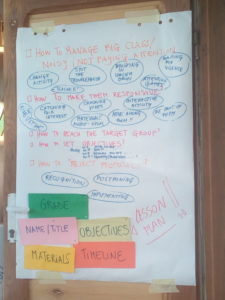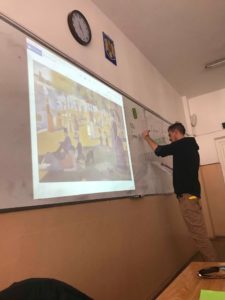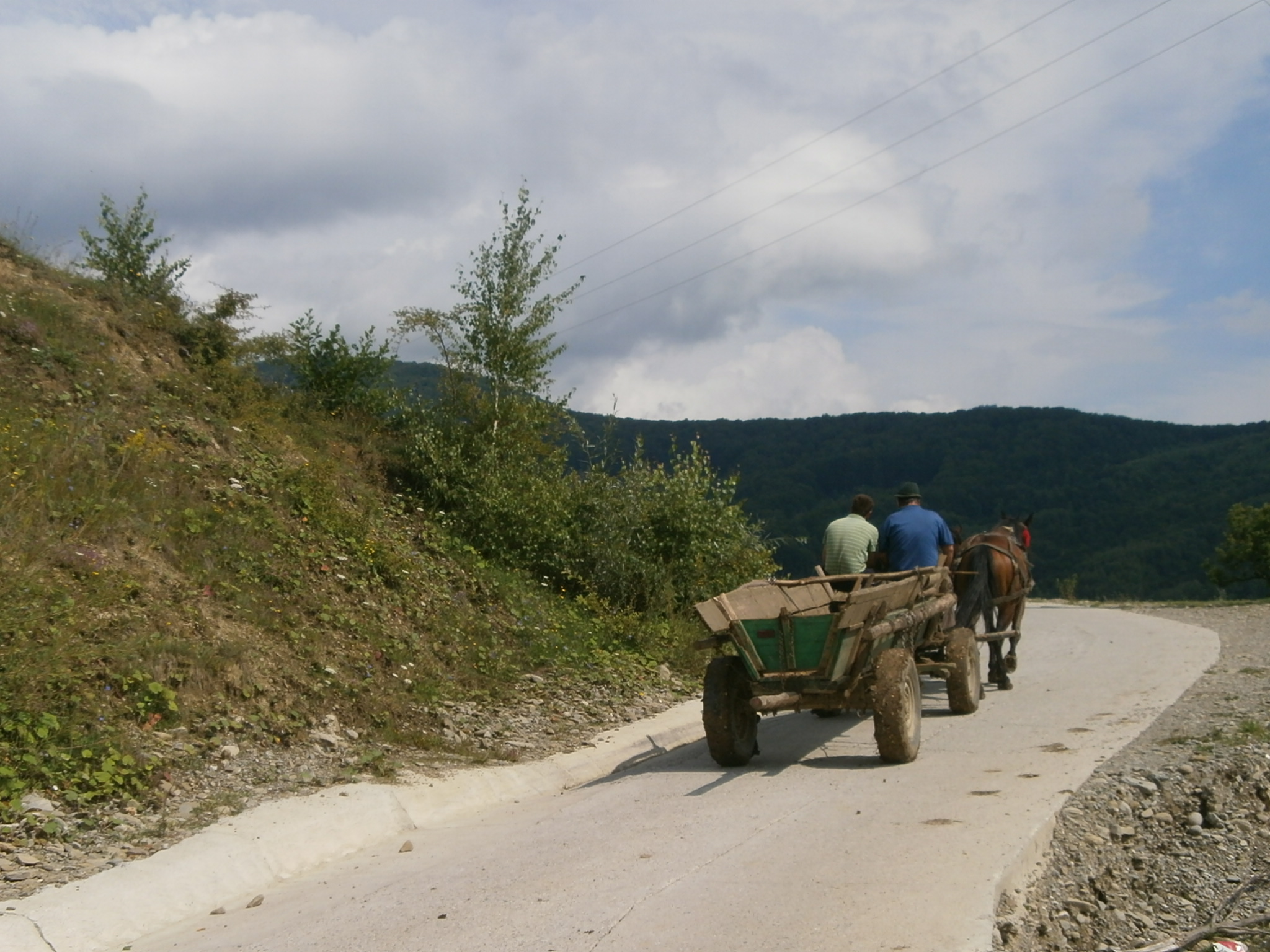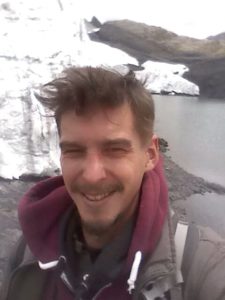First steps with non formal education
When I arrived in Curba de Cultura I knew that because of my project I would have to go to schools to lead classes, propose activities and share knowledge with them in English and French classes; I had been told about non-formal education, we were only then in June and the school holidays had started, so I told myself “we will see later”.
And then, as the summer was over, we were very quickly back to school, and it was time for me to take my first steps in the different schools, not without apprehension! (I had never faced a class in this position before, I have already given tutoring in high schools as well as private language classes but in this way I must admit that I was not reassured…)

Fortunately we were not dropped in the “cage of wild animals” and we received in Curba de Cultura during 3 days, a very enriching, reassuring and funny training on what non-formal education is, non-formal communication, how to set it up and apply it, we received methods, advice and explanations. We put ourselves in situations and we tried each other in “almost” real conditions, (what a laugh that day, we all fell back into childhood!) We were finally ready to start this new activity as serenely as possible (thanks Kristina and Estelle for this training!!!)
Returning to the main theme of this article, non-formal education (which must be distinguished from informal education) can be defined in this way: it proposes a training and learning time designated as such, without this leading to a final validation in the form of an examination to evaluate what has been learned. This lack of a final evaluation corresponds to the state of mind in which it is carried out. It seeks to foster a spirit of initiative in the participant, who is placed on an equal footing with the learner. Autonomy, initiative, democracy, exchange: these are the key words of non-formal education, which proposes, in an open format, to learn things through mechanisms that allow the active participation of all, this can be for example through games, videos, debates, creative workshops, theatre etc.
So it was with all this new knowledge and especially with a lot of impatience that I was waiting for my first class in order to implement all this. The day D having arrived, my activity was ready and settled at the milimetre, stress and apprehension naturally appeared. Fortunately for me, Estelle was present and accompanied me in this brand new experience. Strangely enough, I immediately felt comfortable in this position, in sharing, in feeling that the students were having a good time and that I was too. I knew right away that I would like it a lot. Of course it took me a few weeks to be totally liberated and each new class was and still is a great experience to correct, improve and learn about how to implement non-formal education.
 Today, 3 and a half months after my first experience, I had the opportunity to participate in about forty classes with students ranging from the first grade to the twelfth grade (from the first kindergarten class to the last high school class)
Today, 3 and a half months after my first experience, I had the opportunity to participate in about forty classes with students ranging from the first grade to the twelfth grade (from the first kindergarten class to the last high school class)
We played many games together, sang, drew, watched videos, answered quizzes, tested our memory and concentration, jumped and turned on ourselves… but we also learned many things about cultures, languages, differences, cultural shock, diversity… but above all we had a great time! And it seems to me that this is one of the essential things when you want to transmit knowledge, know-how or even interpersonal skills.
I am happy to have been able to explore and practice this form of education during my volunteer work, which has taught me and brought me a lot of knowledge as much as it has on a personal level and I am now sure that I want to continue and deepen my learning in this way.
/ Traducere in Romana in lucru/
Cultural shock in Romania / Șoc cultural în România

[EN] Three and a half months ago, when I arrived, Romania directly surprised me, keeps surprising me every day and will certainly surprise me the whole duration of my stay here. I am surprised in many ways, whether by the beauty of its landscapes, its people, its customs and habits. It is a country full of surprises and richness that I wish to know more about.
I will speak here of “culture shock”, of things and anecdotes that I was able to see or experience in Romania and that were for me a confrontation with otherness, which were a sign of different reality, than that of my own. Different from my own culture, my own habits.
But before that, I would like to clarify this notion, this idea of culture shock by putting things in context.
Indeed having arrived in Romania only 3 and a half months ago, I would have no pretension to describe “a Romanian culture” in all its aspects. So far I had the chance to know only Izvoarele and its surroundings, Brasov, Bucharest, Sighisoara, Vama Veche and Constanta, so I would not speak only of what I could live or see. I would also like to point out that what I am going to consider as a “culture shock” is strictly personal, the elements will be directly related to who I am: a young French man of 29 years of age who lived in Latin America for several years, to what I have experienced in my life; in other words, these cultural differences could never be the same for another person. And finally there will be no value judgment, no criticism, I would simply be in the shoes of an external observer for whom differences of any kind are a richness to understand others.
My first big surprise when I arrived, while I was still in the car being driven in the rain (having left Paris a few hours earlier under a blazing sun of about 30 degrees…) was to observe the rolling landscapes, curves and mountains, coming from a region bordering Belgium called “the flat country” this difference of landscapes jumped directly to my eyes.
In the days after my arrival there was a line of surprises about my village, between the herds of cows coming down the street every night singing their bells, the countless street dogs quietly making their lives (I have never seen a street dog in France), the fruit/vegetable sellers shouting in the street, the wooden horsecarts used daily or the zigzag moves that you have to do while driving in order to avoid holes in the road: the change of scenery was very complete for me!
In the following days I was very surprised to observe that many people hitchhiked along the roads to get around, or that cars stopped when we were waiting for the bus to offer to take us. That was the point where I decided to try the adventure myself with my first three Romanian phrases, “buna ziua, sunt voluntar, nu am bani”, and my astonishment was even greater when I realized that it was really working very well (not without some nice laughs from the drivers). From here on, I used this method to move around without hesitating (Bucharest, Vama Veche, Brasov, Sighisoara), fortunately I have always come across people who speak a little English, French or Spanish which allowed me to communicate during the trip… And it was still a surprise that in most of these conversations (saw no generality in my subject! it’s just my experience), most people came to talk without any restraint and with hatred about their racism towards the gypsy community. Me being used to people feeling ashamed to have such ideas, that they usually only express them through the ballot box, the freedom of speech that my drivers have reported is confusing to me.
I was also amazed to observe that in the cities, people respect traffic lights, patiently wait for the light to go green in order to cross. Being used to people crossing as soon as the opportunity arose in France or even in Latin America where there sometimes even is no signs, it was a sure fun to observe this.
Then gradually as I grasped another characteristic of Romanian society, which is the place of religion in people’s lives. Religion seems to me to be omnipresent, whether it is through the various religious objects that can be observed in the streets, in front of houses or through the signs of the cross that people make when they meet a church, whether they are elderly or younger, this represents a great cultural difference for me.
More recently I learned when I went with my roommate to the village bar at the end of the day on a referundum day, where the police stationed there, that it was not possible to buy and drink alcohol on election days, people explained to us that this was a law to encourage people to go to the polling station, it seemed very surprising to me and was probably my most recent”culture shock”.
I think I have shared with you the most striking situations and anecdotes for me during these first 3 months in this country, there are obviously others, but probably less significant for me.
I hope now to complete this list while I am here for the next 5 months, to continue discovering and getting to know this very special and endearing country, to confront myself more and more with what cultural differences have to offer us and to learn on a daily basis.
[RO]
Acum trei luni și jumătate când am sosit, Romania m-a surprins efectiv, continuă să mă surprindă în fiecare zi și va continua cu siguranță să mă surprindă pe toată durata șederii mele aici. Sunt surprins în multe feluri, de către frumusețea priveliștilor ei, de către oamenii ei, practicile și obiceiurile ei. Este o țară plină de surprize și bogății despre care îmi doresc să aflu mai multe.
Voi vorbi aici despre “șoc cultural”, despre lucruri și anecdote pe care am putut să le văd sau să le experimentez în România și care au fost pentru mine o confruntare cu altfelul, ceea ce a fost un semn al unei realități diferite decât cea a mea. Diferit de cultura mea, de obiceiurile mele.
Dar înainte de asta, aș vrea să clarific această noțiune, această idee de șoc cultural prin a pune lucrurile în context.
Într-adevăr având în vedere că am ajuns în România cu doar trei luni și jumătate în urmă, nu aș avea nicio pretenție să descriu “O Cultură a României” în toate aspectele ei. Până acum am avut șansa să cunosc doar Izvoarele și împrejurimile sale, Brașov, București, Sighișoara, Vama Veche și Constanța, deci aș vorbi doar de ceea ce aș fi putut să trăiesc sau văd. Aș vrea de asemenea să punctez că ceea ce eu am să consider ca fiind un “șoc cultural” e strict personal, elementele vor fi în directă relație cu cine sunt: un tânăr bărbat francez în vârstă de 29 de ani ce a trăit în America Latină pentru câțiva ani, raportat la ceea ce am experimentat în viața mea; în alte cuvinte, aceste diferențe culturale nu ar putea fi niciodată la fel pentru o altă persoană. Și nu în ultimul rând nu va fi nicio judecată de valoare, nicio critică, voi fi pur și simplu în pantofii unui observator exterior pentru care diferențele de orice fel sunt o îmbogățire care ajută să îi înțelegi.
Prima mea mare surpriză când am sosit, cât încă eram în mașină, condus prin ploaie (după ce am părăsit Paris-ul cu câteva ore în urmă sub un soare arzător de cam 30 de grade…) a fost să observ peisajele ce se derulau prin fața mea, curbele și munții; venind dintr-o regiune aflată la granița cu Belgia numită “țara plată”, această diferență de peisaje mi-a sărit în ochi imediat. În zilele de după venirea mea am avut o linie de surprize când vine vorba de satul meu; între cirezile de vaci ce vin în josul străzi în fiecare noapte cântându-și clopotele, nenumărați câini vagabonzi trăind-și viețile în liniște (Nu am văzut niciodată un câine vagabond în Franța), vânzătorii de fructe/legume strigând pe stradă, căruțele din lemn trase de cai și folosite zilnic sau mișcările în zigzag pe care trebuie să le faci când conduci pentru a evita găurile din drum: schimbarea de decor a fost foarte completă pentru mine!
În zilele ce au urmat am fost foarte surprins să observ că mulți oameni făceau autostopul de-a lungul drumurilor pentru a se deplasa, sau că mașini opreau când noi așteptăm microbuzul pentru a se oferi să ne ia. Acela a fost punctul unde am de ieșit să încerc aventura și eu cu primele mele trei fraze în română, “Bună ziua, sunt voluntar, nu am bani”, și mirarea mea a fost chiar și mai mare când am realizat că merge chiar foarte bine (nu fără niște râsete bune de la șoferi). De aici înainte, am folosit metoda asta pentru a mă deplasa prin jur fără ezitare (București, Vama Veche, Brașov, Sighișoara). Din fericire întotdeauna am dat peste oameni care vorbesc puțină engleză, franceză sau spaniolă, ceea ce mi-a dat voie să comunic de-a lungul călătoriei… Și a fost încă o surpriză că în mare parte din aceste conversații (a nu se vedea generalizare în subiectul meu! este doar experiența mea), majoritatea oamenilor au ajuns să vorbească fără nicio reținere și cu ură despre rasismul lor față de comunitatea țiganilor. Eu fiind obișnuit ca oamenilor să le fie rușine să ai e astfel de idei, așa încât de obicei le exprimă doar prin urna de votare, libertatea de exprimare pe care șoferii mei au raportat-o îmi induce confuzie.
Am fost de asemenea uimit să observ că în orașe, oamenii respectă semafoarele, așteaptă cu răbdare ca lumina să se facă verde pentru a trece. Fiind obișnuit cu oameni care trec de îndată ce oportunitatea apare în Franța sau chiar în America Latină unde uneori nici măcar nu sunt semne de circulație, a fost cu siguranță distractiv să observ asta.
Apoi gradual peste mai mult timp am mai înțeles încă o caracteristică a societății românești, care este locul religiei în viețile oamenilor. Religia îmi pare a fi omniprezentă, fie că prin variile obiecte religioase care pot fi observate pe străzi, în fațele caselor sau prin semnul crucii pe care oamenii îl fac când întâlnesc o biserică, indiferent dacă sunt în vârstă sau mai tineri, aceasta reprezintă o mare diferență culturală pentru mine.
Mai recent am învățat când am mers cu colegul meu de cameră la barul din sat la sfârșitul zilei într-o zi de referendum, unde poliția staționase, că nu era posibil să cumperi și să bei alcool în zilele de alegeri, oamenii ne-au explicat că asta esteo lege care să încurajeze oamenii să meargă la secțiile de votare; a părut foarte surprinzător pentru mine și a fost probabil cel mai recent “șoc cultural” al meu.
Cred că am împărtășit cu voi cele mai izbitoare situații și anecdote ale mele din perioada acestor prime 3 luni în această țară, mai sunt desigur și altele, dar probabil mai puțin semnificative pentru mine.
Sper acum să completez această listă în timpul în care sunt aici pentru următoarele cinci luni, să continui descoperirea și cunoașterea acestei foarte speciale țări ce te face să o îndrăgești, să mă confrunt pe mine mai mult și mai mult cu ce au diferențele culturale să ne ofere și să învăț zi de zi.
Baptiste este în România pentru o perioadă de opt luni, din iulie 2018 până în februarie 2019, în cadrul proiectului Voluntary Generation [2017-2-FR02-KA105-013326] proiect co-finanțat de Uniunea Europeană prin Programul Erasmus+ și implementat în România de către Curba de Cultură.
Portret de voluntar – Baptiste (Franța)
 Bună ziua, Hello everybody !
Bună ziua, Hello everybody !
I am Baptiste, new volunteer in Curba de Cultura, freshly arrived in this beautiful setting that is the region of Prahova.
I am 29 years old and I come from a small town in the north of Paris, I also lived in the north for my studies but also in the south and in the Alpes for work.
I graduated from a master of anthropology that I validated in Peru, coutry in which I lived for 3 years and in wich I went back to travel, Latin America is a continent that fascinates me.
I think I am open minded, frank and open to the others, I love the human and what he brings to me everyday. I also love children very much, their innocence and seeing them happy. I like to tell myself that they are the future. I had the opportunity to do a volunteering of 6 month in Peru with childrens and since the urge to restart a project of the genre never left me. It is for this reason that when the opportunity to realize an EVS with Curba de Cultura presented itself to me, it is without any hesitation that I jumped on this chance.
Romania is a country that I have always wanted to discover, its culture, its inhabitants, its landscapes, so it is a dream that become reality by coming here. I love travels, the meetings, the discovery of new cultures that enrich me spiritually. I also love the nature, the calm and the serenity that it brings to me.
For all these reasons, what better place than Izvoarele to accomplish me fully by providing valuable help through the tremendous work done by Curba de Cultura.
Eu sunt Baptiste, voluntar nou la Curba de Cultură și tocmai ce am ajuns în acest loc minunat din județul Prahova. Am 29 de ani și vin dintr-un mic oraș de la nord de Paris. Am locuit în nordul Franței cât timp am studiat și în sud, în Alpi când am lucrat.
Am absolvit un master in antropologie în Peru, unde am locuit de altfel încă 3 ani și unde m-am întors pentru a călători, America Latină mă fascinează.
Consider că sunt deschis la minte și direct. Iubesc oamenii și tot ceea ce aceștia îmi oferă. Îmi plac copii și să îi văd fericiți, deoarece ei sunt viitorul nostru. Am avut ocazia de a face 6 luni de voluntariat cu copii in Peru iar de atunci nevoia unui proiect similar nu m-a mai părăsit. Acesta este și motivul pentru care am ales acest proiect la Curba de Cultură, când mi s-a oferit ocazia.
România este o țară pe care am dorit dintotdeauna să o descopăr, să îi descopăr cultural, locuitorii, peisajele, prin urmare sosirea mea aici este un vis devenit realitate. Iubesc să călătoresc, să întâlnesc oameni și să descopăr culturi care mă îmbogățesc spiritual. De asemenea iubesc natura cu calmul și liniștea pe care mi-o aduce.
Pentru toate acestea ce alt loc mai bun există, decât Izvoarele, pentru a mă simți împlinit și a aduce ajutor valoros muncii pe care curba de Cultură o desfășoară?
Baptiste este în România pentru o perioadă de opt luni, din iulie până în februarie 2019, în cadrul proiectului Voluntary Generation [2017-2-FR02-KA105-013326] proiect co-finanțat de Uniunea Europeană prin Programul Erasmus+ și implementat în România de către Curba de Cultură.